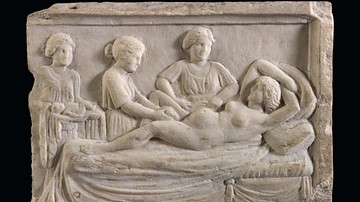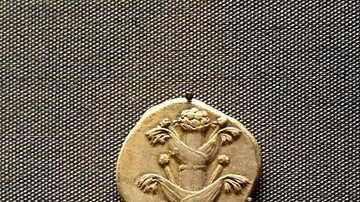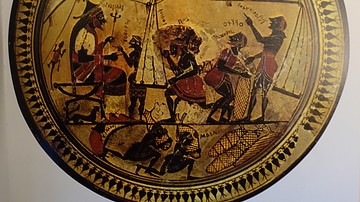Search
Did you mean: Uranus?
Remove Ads
Advertisement
Summary 
Loading AI-generated summary based on World History Encyclopedia articles ...
Search Results

Article
Childbirth in Ancient Rome
Childbirth in ancient Rome was considered the main purpose of marriage. Roman girls married in their early teens, and in elite society, some married before they reached puberty. The legal age for marriage was 12 for a girl; 15 was accepted...

Image
Positions of the Embryo in the Uterus in Soranus of Ephesus' Gynaecology
A Latin version of Gynaecology by Soranus of Ephesus, showing positions of the embryo in the uterus.
Codex 3714, fol. 28r.
Bibliothèque Royale, Brussels.

Definition
Hippocrates
Hippocrates was born on the Greek island of Kos in the 5th century BCE, and he became the most famous physician in antiquity. He established a medical school on the island, wrote many treatises on medical matters, and is, through his systematic...

Definition
Silphium
Silphium (also known as laser) was an uncultivated plant that grew in Cyrene, North Africa (modern Shahhat, Libya) and became the cash crop of the region of Cyrenaica between c. 631 BCE and the 1st century CE when, according to Pliny the...

Article
Roman Girls and Marriage in Ancient Rome
In ancient Rome, the legally acceptable age for marriage for girls was twelve. Although in middle-class Roman society, the most common age of first marriage for a girl was mid-to-late teens, evidence also shows that in a section of elite...

Article
Family Planning in Greco-Roman Antiquity
Family planning was a topic of vital importance in the ancient Mediterranean. Some of the earliest medical literature from ancient Greece and Rome deals with fertility and reproductive health. Among the numerous treatments and procedures...

Definition
Roman Medicine
Roman medicine was greatly influenced by earlier Greek medicine and literature but would also make its own unique contribution to the history of medicine through the work of such famous experts as Galen and Celsus. Whilst there were professional...

Article
Theophrastus and Pliny the Elder on Silphium
The silphium plant of Cyrene, valued as a seasoning, aromatic, and for its medicinal properties, is referenced by several notable ancient writers, but two of the best-known descriptions come from Theophrastus (l. c. 371 to c. 287 BCE) and...